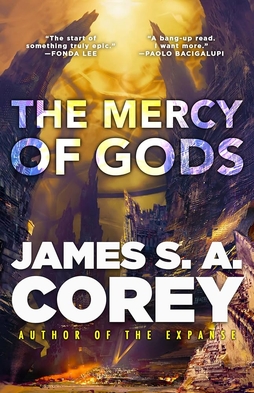Book review: The Mercy of Gods, by James S.A. Corey

I didn’t try to read The Mercy of Gods, by James S.A. Corey, when it came out last fall because I kind of felt like I should finish their The Expanse series first — not that finishing should have been hard, but there are so many books and shows, so little time! But then I heard a really interesting discussion of TMoG, and put myself on my library’s waitlist. I finally got the audio version, and it’s great! I’m now waitlisted for the novella Livesuit, and I hope to read book 2 in The Captive’s War series as soon as it comes out (expected this fall). The Mercy of Gods (and presumably the entire Captive’s War series) is science fiction about different types of resistance, and choices, under occupation and enslavement. It’s mostly told in third-person limited past tense, from the perspective of conquered humans, but the framing device is a partial summary/explanation by a conqueror librarian (or liaison) from the side of the alien Carryx, who laments not having realized the danger the humans posed. So although armed human resistance is swiftly defeated, and a lot of the book is grim, there is a spark of hope throughout. The humans in this space opera, who lived on a lost settlement world (obviously not their original homeworld, due to evidence of terraforming and lifeforms that are not biochemically compatible with them), never had a chance when their conquerors came from space and immediately killed off an eighth of their population as a show of force. After a few futile days of armed warfare, numerous humans are taken prisoner and transported offworld to be assessed for suitability as servants/workers/slaves (“animals” according to the Carryx). Most of the POV characters are members of a scientific work group that had been trying to find ways to make alien lifeforms compatible, for nourishment, pharmacology, and similar purposes; the conquerors see the potential value of this and keep the group together. Tommen, the brilliant scientist in charge, nearly gets himself killed arguing for more privileges for the group; researcher Jessyn Kaul focuses initially on personal survival after losing access to maintenance drugs. Dafyd Alkhor, a semi-slacking young research assistant who’d obtained his job through political/familial connections, uses his prior networking skills to closely observe the conquerors and other subject species to try to figure out what behavior is desired from them. Some might view Dafyd as a collaborator, but he’s playing the long game, believing the aliens who’d said humans would be judged for their usefulness and concluding that their survival depended on that (especially since it turns out that they’re in competition with other subject species). This inevitably brings him into quiet conflict with the people who long for revenge and think that violently demonstrating their utter unsuitability as slaves will lead the Carryx to simply leave humans alone. Eventually, Dafyd has to make a crucial choice. Also active in the plot is a secret infiltrator from another species that’s already fighting the Carryx. The reader meets the Swarm entity early, but it’s only much later in the book that they reveal themselves to Dafyd, to tip the balance in his internal argument of freedom-fighting vs. the long game by giving him hope for the future. Given the Swarm’s method of infiltration (taking a human host), I’m unconvinced that they’re a reliable ally, but they certainly strongly oppose the Carryx. I expect that later books will reveal more about their nature and goals. The Mercy of Gods reminds me a lot of a great 1990 book by C.S. Friedman, The Madness Season. That’s set 300 years after hive-minded aliens conquered the Earth; the main character is a man who faintly remembers the days before. After the aliens discover some of his differences and take him offplanet to study him, he starts remembering more about himself, and escapes; eventually, he meets an energy being who can assume human form. Meanwhile, there’s a group of human technicians who work for the aliens but are part of a long-term resistance plan, and there’s one aberrant hive alien struggling to understand individuality. This is a truly fascinating book that explores various concepts in amazing ways, including different methods of adaptation and survival under subjugation, and various forms of identity (self vs. species, and selfhood through evolutions of memory, ability, and purpose). The Mercy of Gods also explores identity, via the Swarm’s assimilations and through people deciding who they are under great changes and stress, but it also explores group dynamics in some ways I haven’t seen much, at least not in such depth. The people whom we follow after the invasion are perforce grouped together as captives, and they mostly try to take care of each other, as much as they’re allowed, but some of them also start forming resistance cells. Tommen retains nominal control of the research group’s activities (he’s enraged to discover that Jessyn has been working on a private project), but Dafyd gradually assumes leadership of their interactions outside the lab. People who’ve relied on others are forced to discover their own capabilities, and various other personal loyalties and associations undergo shifts as events unfold and enforce new priorities. The Mercy of Gods is definitely not for everyone; its generally grim tone, punctuated by extreme violence and body-horror issues, may make it harrowing for some. However, the ideas it explores are fascinating, and the way it upholds patience, careful observation, and critical thought, along with the hope of future victory, are encouraging. Despite the tight focus on characters, the worldbuilding is vast and leaves lots of room for more developments. I found it thoroughly engaging and compelling, and I look forward very much to the next installment in The Captive’s War. Orbit Books published The Mercy of Gods, by James S.A. Corey, on Aug. 6, 2024. It’s the first book in a planned trilogy, plus two novellas, called The Captive’s War. Content warnings: War, population decimation (well, an eighth, even worse than a tenth),
Short Fiction Review: May 2019

My favorite stories from May all happened to be about resistance. They all had good and satisfying endings, although none of them had a clean ending where everything was wrapped up neatly with a bow. Then again, I don’t think resistance often works that way. First, I loved “Everything is Closed Today” by Sarah Pinsker. It’s delightful tale about skater girls, activism, and building community, and it appears in Do Not Go Quietly: An Anthology of Victory in Defiance edited by Jason Sizemore and Lesley Conner. Next, I recommend Joe Ponce’s “Raices (Roots),” which appears in Issue 7 of Anathema: Spec from the Margins. It’s a powerful and important story about immigration, border justice, and political consciousness. Lastly, if you love academic scholarship and theory — or, for that matter, if you hate those things — you must check out “Ten Excerpts from an Annotated Bibliography on the Cannibal Women of Ratnabar Island” by Nibedita Sen in Issue 80 of Nightmare Magazine. Now, on to the reviews!
Short Fiction Review: June 2018

My favorite story last month was “In the End, It Always Turns Out the Same” by A.C. Wise, which appears in The Dark Issue 37. It’s a smart, dark take on the Scooby Doo formula that pauses and asks, “Aren’t they too young for this?” Like poetry and space opera? Go read “I Sing Against the Silent Sun” by A. Merc Rustad and Ada Hoffmann, which appears in Lightspeed Magazine Issue 97. In this harrowing yet hopeful story, a poet-revolutionary is hunted by a god of silence. (Also, this story makes me happy because of its genderfluid and nonbinary representation.) I also enjoyed “The Sweetness of Honey and Rot” by A. Merc Rustad, which appears in Beneath Ceaseless Skies Issue 254 (21 June 2018). It’s a story about the costs of resistance, and it features original, inventive worldbuilding and gorgeous, detailed prose.

